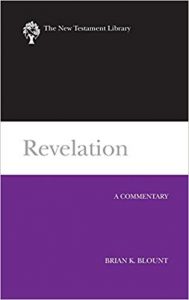Brian K. Blount (Ph.D. from Emory University) is a Presbyterian minister, New Testament scholar and current President of Union Presbyterian Seminary. He is also the author of the Revelation commentary in the New Testament Library series. Dr. Blount is a noted preacher and scholar on the Book of Revelation..
Dr. Blount is the associate editor of The New Interpreter’s Dictionary of the Bible and associate editor of True to Our Native Land: An African American New Testament Commentary. He also co-authored Struggling with Scripture with Walter Brueggemann and William Placher.
7 Questions on Revelation in the New Testament Library Commentary Series
 Recently, Dr. Blount kindly answered my questions about his Revelation commentary. Readers will learn how this commentary came to be, what is unique about it among Revelation commentaries, and how the project edified him personally.
Recently, Dr. Blount kindly answered my questions about his Revelation commentary. Readers will learn how this commentary came to be, what is unique about it among Revelation commentaries, and how the project edified him personally.
1. What previous research and/or personal interests led you to this project and helped prepare you to write this commentary on Revelation?
I have enjoyed working on apocalyptic materials, particularly focusing on the presentation of how the force and presence of the future Reign of God has dawned in the present historical circumstance. I did most of my research prior to Revelation in the Gospel of Mark, building the argument that in Jesus’ person and ministry the future had broken into the present. This future inbreaking, represented in Jesus’ ministry, is expected in the narrative of the gospel to be re-presented in the lives of the disciples. It is this focus on the power of apocalyptic to shape the present that has fascinated me across the years. I was interested in seeing how the most visibly apocalyptic work in the New Testament handled this coordination of future expectation and present realization.
2. Who is the intended audience for this commentary? Would it benefit pastors? professors? students? lay Christians in the local church?
It is my hope that the commentary can be beneficial for all Christians. The primary audience consists of pastors, students, and professors. But I believe that it can also be useful for Christians who are interested in learning more about the Book of Revelation. I have used the research in many church contexts of adult education across the years. The material has been enthusiastically received.
3. What is unique about this commentary? What contribution does it make to studies of Revelation?
I believe that it gives a narrative discussion of John’s intent in the book, so that the book is understood from the thematic intent that I believe John of Patmos had in writing it. This intent carries through the book and shapes the individual texts. I try to explain the individual texts in light of this thesis, therefore. The book is seen more as a whole in this way, as a study into the overall design the book has for pushing its readers to witness in ways that will be transformational in their world.
4. What section or passage of this commentary was particularly memorable to research and write? Why?
Chapter 12. Though I believe the heart of John’s intent is in chapters 2 and 3 where he outlines his concern and reveals his thesis intent for the work, the poetry of chapter 12, along with the conflict narrated, were the most thrilling parts of the study for me. I believe, too, that a key passage for the thesis of the work, 12:11 is also here. It is helpful to see this key ministry message located in the heart of this wonderfully creative and insightful section that uses poetic imagery to convey a provocative narrative.
5. What personally edified you in writing this commentary, increasing your affections for Christ?
The language of witness for the Lordship of Christ in the world and the expectation that we are all called to witness even knowing that the cost for such witness can be devastatingly high.
6. Besides your commentary, what are your top recommended books (commentaries or otherwise) on Revelation?
I have enjoyed directing students to commentaries by Eugene Boring [Interpretation, John Knox Press] and Mitchell Reddish [SHBC].
7. What is next for you? What project are you currently working on? How can people follow your work and ministry?
Because I have been an administrator for years, I have not had as much time to do this level of research lately. My last book was an apocalyptic view of resurrection. I continue to be fascinated by apocalyptic materials.
Own Brian Blount’s Revelation commentary
The link provided will direct you to this volume via it’s exact ISBN number:
- Get Dr. Blount’s commentary on Revelation at Amazon
- Get Dr. Blount’s commentary on Revelation on Christian Book Distributors
Recent Posts
David Jeremiah, a renowned pastor, author, and speaker, has captivated the hearts of many with his compelling sermons. His messages resonate deeply with diverse audiences, leaving an enduring...
Tim Keller, a distinguished pastor, theologian, and author, has garnered a devoted following through the profound impact of his sermons. In this article, we will explore seven compelling reasons...
